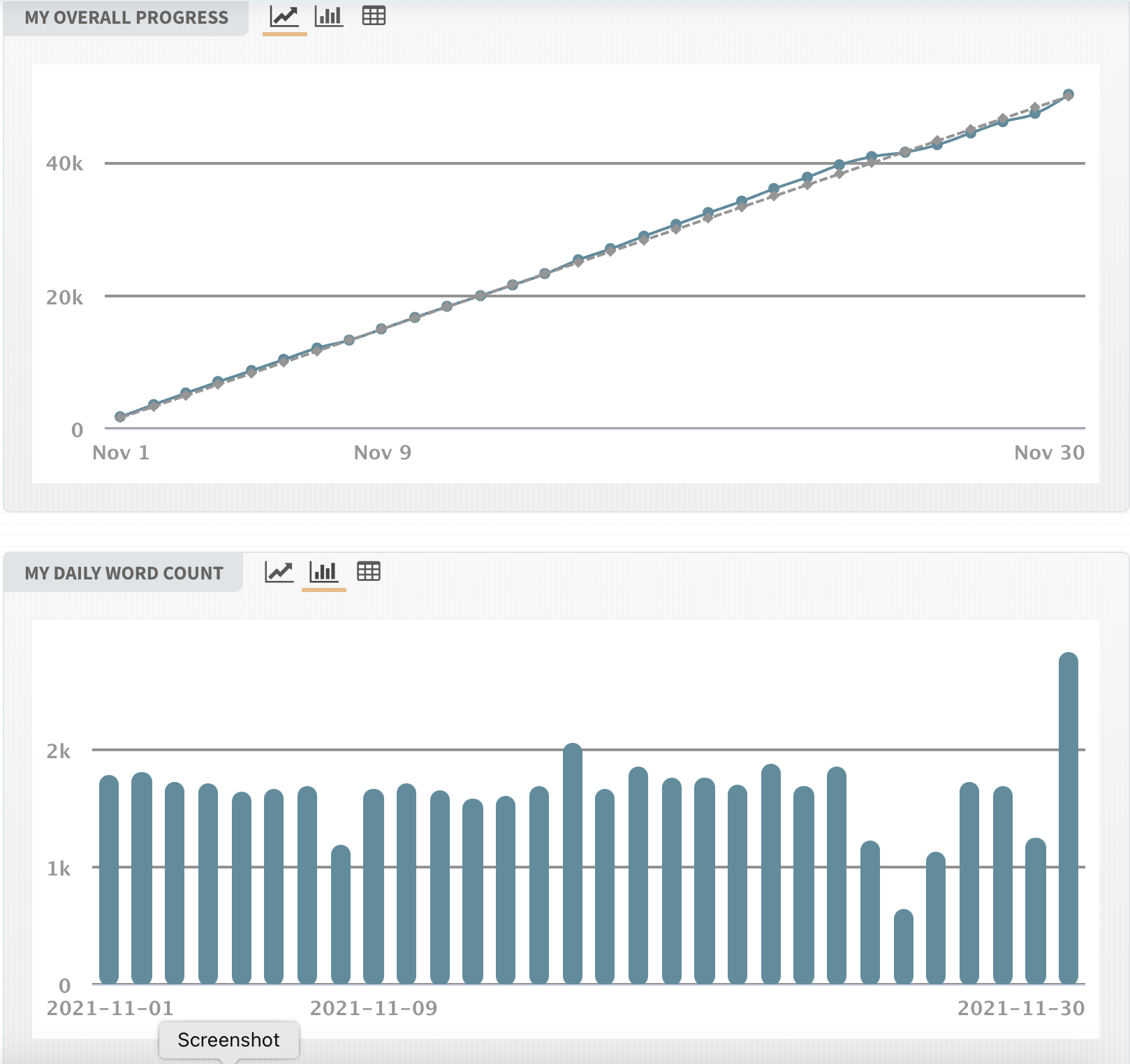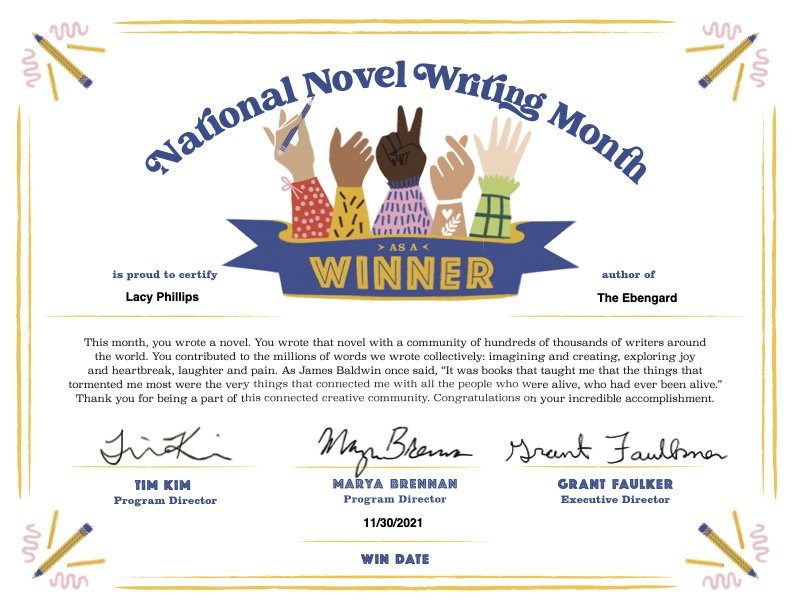Every November since 1999, hundreds of thousands of writers have joined together with a common goal, to each write 50,000 words in 30 days during National Novel Writing Month. NaNoWriMo has a special energy in the writing community. Sometimes it’s a frustrating energy, and sometimes it’s invigorating. I’ve experienced both sides of that coin.
The first time that I attempted NaNoWriMo was in 2017 when I was first starting to take writing seriously again after a long hiatus to change careers, get married, and start a family. I’d already been working on The Penitent Magdalene from about 2015 off and on, and wanted to use NaNo as a way to get into a more consistent writing practice and get more of my first draft done. I wrote about 12,000 words and I believe they’ve all been cut. I had no ability to meet the daily word count goal and gave up about a week into the month.
Though 2018 saw some improvements when I again attempted to add to my unfinished draft for The Penitent Magdalene. I was able to meet the benchmark word count goals… for about 7 days before losing all momentum. Still, I netted about 20k new words! Unfortunately, they weren’t driving the story forward in a meaningful way, and were again all cut from the current draft. I found participating to be really frustrating because I kept comparing my failures to everyone else’s successes.
2019 was a more serious attempt. I had learned a lot about how I write best, and tried to carry those lessons into doing NaNo as a “rebel” or someone who sets their own goals and operates outside the 50k words to win rubric. That year I was able to make sustained progress for about two weeks of the month and I ended up writing 25k words. I think some of them have even survived in the draft!
2020 was a wash. I didn’t even attempt to participate because I had contracted COVID at the end of October and was really sick until the second week of November.
When November rolled around in 2021, I had been toying with two alternate concepts that I’d been mulling over. I had started a new job and had already decided to step away from The Penitent Magdalene while I settled in. When that job went tits up on about October 24th and I ended up in a situation where I had several days of severe panic attacks due to that work situation, I wasn’t sure if I’d be in a good mindset to start a new writing project.
When the 1st came, I still hadn’t even decided which of the two concepts I had written very brief summaries for that I wanted to try to tackle. But I was feeling the need to chalk something up in the win column after my recent professional setbacks. So, as one does, I polled my writing group on our Slack channel, my book club on the Discord, and the Writing Community on Twitter.
Which story should I work on during #NaNoWriMo, #WritingCommunity?
— Lacy (she/her) - 50,283/50,000 (@reachwriter) October 21, 2021
One group chose the rom-com options. Another chose the fantasy adventure. Twitter chose the fantasy adventure.
I opted to start the fantasy adventure, not because of the Twitter poll, but because I’d only come up with the concept for the rom-com a few weeks before and hadn’t fleshed out the characters or story yet, whereas the fantasy adventure was something I started thinking about in January of 2020. I’d made several notes and sketches about it including roughing out two acts of an outline and a first pass at an opening scene. So it was already well-formed in my head, and I’d already begun taking it somewhat seriously as a project I wanted to put some effort into …eventually.
Well, I still wasn’t feeling up to going back to my main WIP after struggling to get a single 5k chapter finalized after working on it all summer, so no time like the present to just play around with a new project that I have very little invested in.
On day 1, I wrote a summary, and started a document to keep notes on character names and worldbuilding in. That’s always the fun part for me, dreaming up characters and settings, and I have a lot of fun naming things. But there was a lot of new territory I was covering in that first week because I’d never tried to write fantasy before. I was learning on the fly how to keep internal consistency while developing a magic system!
Right away, I could feel it going really well. The first week of writing sessions were fun. I didn’t use the material I’d already written because I’d already made some adjustments to the characters and world in my head and certain aspects of their dialog no longer made sense. So I re-wrote it and liked what I ended up with well enough.
At the close of the first week, having been able to meet the daily benchmark goals consistently and knowing that my four previous attempts at NaNoWriMo lost steam after the first week, I began to get worried. I’d also taken on a paid contract opportunity and had a report due before November 10th, so I had to make sure to manage my time really carefully. I had a little post-it note on my desk with daily goals for the project and I made sure to tackle that first before doing my writing sessions. I was very proud of myself when I was able to turn in the report a full day ahead of schedule, even though I’d sacrificed getting enough sleep to get it done and keep up the pace to stay on track with NaNo.
Did I fuck around and almost get behind on day 4 of #NaNoWriMo?
— Lacy (she/her) - 50,283/50,000 (@reachwriter) November 5, 2021
Yes.
Did I pull it together at the last minute and get to the goal?
Also yes.
Have I ever been able to sustain the benchmark pace after 5 days before?
That would be a no.
But if I thought clearing that other task off of my to-do list was going to make going into the second week of NaNo smooth sailing, was I ever mistaken! I was anxious that I’d lose steam as time went on, and I did, but I was also able to push through some bad days caused by my chronic illness and continue meeting the benchmarks.
The biggest problem I had going into week 2 wasn’t that I didn’t have the time to write, it was that I hadn’t started the month with a firm outline past a certain point. And the last thing I wanted to do was get caught in an eddy like in years past where there was movement, but no forward momentum in the story. So I spent some time digging up the outline I’d put together in the spring and re-working it with what changes writing the first 20,000 words had informed.
When I hit 25k, that was officially a personal best for me for NaNoWriMo attempts, and it was such a great feeling to be halfway through and not be woefully behind.
NaNoWriMo update:
— Lacy (she/her) - 50,283/50,000 (@reachwriter) November 16, 2021
Halfway there! Keeping up with the proscribed pace, so far. A few bumps in the road when I haven't been feeling well (chronic disease life!) but I've been able to meet the daily word count goal consistently. I'm not getting ahead, but I'm not behind, either. pic.twitter.com/HlO9xrPOrU
But things were getting difficult. My sleep schedule was completely screwed from staying up until I’d met the benchmark every night, and I was in a race to keep ahead of the story to plan scenes then write them instead of spinning my wheels going into a writing session with no idea where the story was going to go.
Around 40,000 words, I recorded these observations:
I've progressed to 75% of the goal of writing 50,000 words in November.
Is it a masterpiece?
No.
Is it actually readable?
Probably, if you like fantasy adventure stuff that's not real deep. I haven't actually tried re-reading much of it. It's coherent, at least. And I'm starting to get a picture of where it's lacking emotional impact and where the stakes need to be tweaked, but I'm going to let it all rest and try to address all of that AFTER I have a completed draft! I mean, it's derivative as hell, but originality wasn't the goal. Fast was the goal. And in that it's successful.
I've written my way into the second act where I ran out of outline to guide me, so I'm afraid the story starts to meander. This is not surprising because MESSY MIDDLES are my thing. I get 20k words into a novel-length work and lose all focus. However, I did set aside some time this past week to hammer out a roadmap to carry the story into the final act, so I'm hoping that will smooth the way for upcoming writing sessions.
That being said, some of the daily writing sessions have become a real slog. If I'm in the document for more than 4 hours, I'm just severely over it. So far I've been able to push through the frustration and stay with it until I meet the daily goals. Usually, by the time I have two pages filled, I'm stopping every few sentences and taking a count. As soon as I've hit the magic number I slam my laptop closed in disgust and go to bed! It's not a great way to work and I have severely screwed my sleep schedule and have neglected a zillion other things in my life, but I really want to see it through to the end of the month just to be able to say I did it!
I've figured out that 50k will probably get me through the second act of my outline, so then there will be maybe 20-30k more, which seems doable through December.
How's the #NaNoWriMo WIP coming, you ask? pic.twitter.com/ozk0SMa2iP
— Lacy (she/her) - 50,283/50,000 (@reachwriter) November 18, 2021
How's my #NaNoWriMo WIP coming along? pic.twitter.com/rqxcIMcyoI
— Lacy (she/her) - 50,283/50,000 (@reachwriter) November 19, 2021
Going into the Thanskgiving holiday, I was still able to meet the daily goals consistently, and had even banked enough extra words to give myself a one day lead. But then things started to go slightly off the rails. I was still able to write every day, but there were several days when I didn’t meet the benchmark and I blew my lead and started getting slightly behind.
How my #NaNoWriMo WIP coming??
— Lacy (she/her) - 50,283/50,000 (@reachwriter) November 28, 2021
Send snacks! pic.twitter.com/Ld6egO6pl4
How's my #NaNoWriMo WIP coming, you ask? pic.twitter.com/nivliNiP3O
— Lacy (she/her) - 50,283/50,000 (@reachwriter) November 25, 2021
At one point I was only about 6k words from finishing, but was consistently missing the daily benchmarks and falling further and further behind. I was just so wiped out that I missed a whole day of writing by just sleeping through it. It was definitely a “neglect every bit of housework and ignore my family” weekend during the final stretch. On the final day, I had 3,500 words to write to win, and one panic attack and a skipped choir practice later, I did it!
It was technically 1:25am when I finished, so I didn’t squeak in under the midnight deadline, but I always writer after midnight and count those words on the previous day’s count, so I didn’t stress about it.
Despite the issues at the end of the month when I wasn’t meeting the daily counts, I was most proud about the consistency I was able to maintain all month long.
I've never been able to do that before. I’ve been working for a long time to try to get into a daily practice of writing and have challenged myself to meet a standing goal of 500 words per day. I consistently miss that goal, but I have been making improvements on writing for at least one 25 minute sprint session every day.
I’m much more proud of the consistency of writing every day than I am of the magical 50k number that means I “win” because that consistency has been a goal that I’ve been actively working towards.
I’m really glad I gave NaNoWriMo another chance after years of finding it a frustrating experience that made me feel bad about myself and my abilities. There were several things I did differently this year that helped me gain a new appreciation of the event. For one, I did it the “traditional” way, by starting a new draft on day one and doing no editing along the way. Usually when I’m drafting, I read back over what I wrote the previous day and make some line edits. I didn’t do that in the spirit of “noveling with abandon” during NaNo. In past years, trying to continue work on a WIP that doesn’t lend itself to fast drafting due to stylistic choices I’ve made and a complete lack of outline was not working at all, so I’m glad I chose a concept that I am a lot less invested in to work on to practice fast drafting.
Another big difference is that I’m not sure how many years I’d been living with an undiagnosed thyroid disorder, but it had probably been ongoing from the time I tried to participate in my first NaNo and possibly ever since I started writing my main WIP, The Penitent Magdalene. One of the main effects of this illness has been cognitive disorder, including an extreme inability to focus and memory problems bad enough that I exited the workforce in 2020 due to inability to be effective in my role. This is the first time I’ve participated in NaNo while on the appropriate medication and when I tell you that the difference has been night and day, I’m not sure such a trite phrase can really convey what I mean. All I can do is describe the frustration of sitting down at the keyboard to work and not being able to finish a single task, no matter how simple. There were times I couldn’t read because by the time I’d gotten to the end of a sentence, I had forgotten what the first words had been and couldn’t string the meaning together.
Same with sitting in on video conferences with my writing group. There had been times I really couldn’t follow the conversations very well and I felt quite stupid and not like myself at all, but now I’m even able to recall myself to a previous point if I get side-tracked which is not something I was capable of previously. My endocrinologist describes it to me as “reversible dementia” if that helps you form an idea of what I was up against. Needless to say, it’s debilitating for a writer.
This year, I could tell a HUGE improvement in the way my brain was able to plan the story, process words, and stick to the task until it was completed every day.
BLESS MY ENDOCRINOLOGIST WHO LOOKS LIKE JOSH GROBAN AND HIS MAGICAL PRESCRIPTION PAD FOR GIVING ME THE GIFT OF LEVOTHYROXINE SO MY BRAIN CAN FUNCTION AGAIN.
Wish me luck getting the final 30k or so words down to finish the story!





